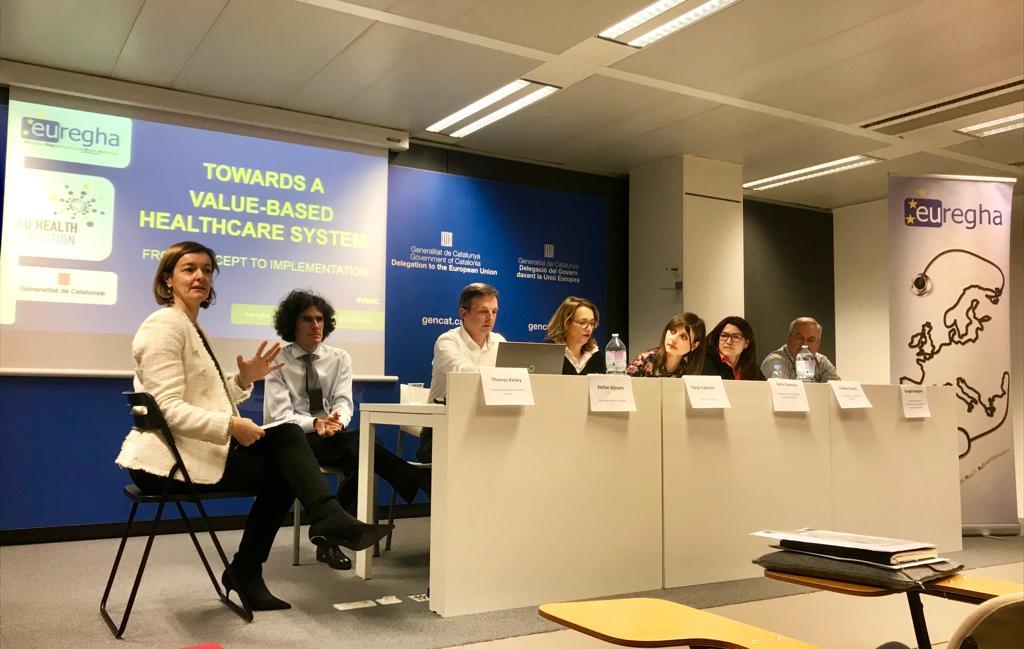
On April 10, the conference “Towards a Value-Based Healthcare system: from concept to implementation” promoted by EUREGHA took place at the Delegation of the Government of Catalonia to the EU. During the event, different health stakeholders had the opportunity to address important topics related to VBHC implementation and engaging with an audience made of representatives of the EU institutions, international organisations, regional and local health authorities, patient organisations, industry, and European associations.
Meritxell Serret Aleu, Representative of the Government of Catalonia to the EU, welcomed the speakers and the participants and expressed her interest for VBHC implementation as a new model to overcome the unprecedented challenges European healthcare systems are facing. Ms Serret Aleu also highlighted the importance of a patient-centric approach that focuses on patients’ needs as a basis for future reforms in European healthcare systems.
Claudia Vaz focused on the importance of outcome measurements. The lack of outcome measurements is a global barrier to healthcare improvement. Where available, outcomes are hard to compare because they are not standardized and, most of the time, they are not patient-focused. Thanks to the work of leading clinical experts from all around the world, ICHOM is developing a new paradigm focused on health outcomes – namely, results that matter most to patients.
This is done through:
- The definition of internationally recognized Standard Sets of outcomes
- The facilitation of the adoption and integration of outcomes measurement
- The provision of risk-adjusted international benchmarks on outcomes by medical condition enabling cooperation and creating outcome measurement communities to share best practices.
Prof. Sabina Nuti presented a case study related to 12 Italian regions on performance evaluation. Performance evaluation is aimed at detecting best practices, in order to spread the most effective organizational solutions to assure system improvement. Performance evaluation at a regional level is done through IRPES (Inter Regional Performance Evaluation System) which is based on approximately 400 indicators and it provides 12 regional healthcare systems with a multidimensional assessment of appropriateness, efficiency, financial sustainability, effectiveness, and equity. In the last two years, Tuscany Region started as a pilot region with Patient Reported Outcomes (PROMs) and Patient Reported Experience (PREMs). This approach has resulted in a better regional performance.
Thomas Kelley had the opportunity to explain how Wales managed to put Value at the centre of its healthcare system. The long-term goal of healthcare system in Wales is to ensure longer and healthier life to people, with quality and high standards. The NHS decided, therefore, to bring a group together in order to facilitate the dialogue since there was a need for a multi-professional structure (including commercial and non-commercial partners) to align on priorities and to work together to drive the implementation of VBHC. A strategy to scale VBHC across the NHS from 2019-2022 has been adopted in Wales. Thanks to its work, Wales is increasingly recognized as one of the internationally leading examples of the practical implementation of value-based healthcare.
Stefan Gijssels presented important EU health coalition’s recommendations that will help our healthcare systems to focus on Value and patients’ needs. The EU Health Coalition co-created a set of recommendations that outline their vision for health in Europe and introduced them at the first ever EU Health Summit in November 2018. Some key recommendations for EU Action for a Healthier Europe are in line with a VBHC approach:
- Support the implementation of standardized measurements of health outcomes and healthy life years
- Facilitate multi-stakeholder partnerships with regions and cities
- Establish a European Health Data Institute to produce a range of health data to inform the work of policymakers, researchers, industry and healthcare providers
The VBHC model can help the EU to deliver the best outcomes for patients in Europe by prioritizing value, patients’ needs and quality.
During the roundtable discussion, stakeholders seemed to agree on some important points:
- Cooperation is central. All stakeholders involved need to share a common vision and common objectives in order move towards the same direction.
- Outcome measurements, benchmarking and exchange of best practices are fundamental.
- Balance between standardization and individual perspective is needed.
- Efficient resources’ allocation: VBHC model provide us with the tools through which outcomes can be improved and costs and wastes can be reduced.
- The EU plays a fundamental role: it can provide a common framework to actors involved and it can sustain Member States in the implementation of this new model.
The event concluded with Sylvain Giraud’s closing remarks. Mr Giraud, Head of Unit at the Directorate-General for Health and Food Safety, European Commission pointed out the importance of the terminology. As a matter of fact, one of the questions posed by the European Commission to the Expert Panel on effective ways of investing in Health has to do with the definition of “value”. The concept of value is also related with cost effectiveness (that is, value for money). This is the reason why VBHC is not just about the patient’s perspective, but it focuses on our systems’ sustainability as well. In order to build an effective, sustainable, accessible and dynamic HC system, we need to abandon the traditional approach. An outcome-based healthcare model will improve both quality for patients and value for money in the system and in order to move from the concept to the concrete implementation, regional and local authorities need to play a key role in the process.
In the next months, EUREGHA will continue to engage in Value-Based healthcare approach. Our objective is to facilitate exchanges and to nurture the debate on VBHC by promoting cooperation, sharing knowledge, facilitating dialogue and creating ties with all relevant stakeholders.


